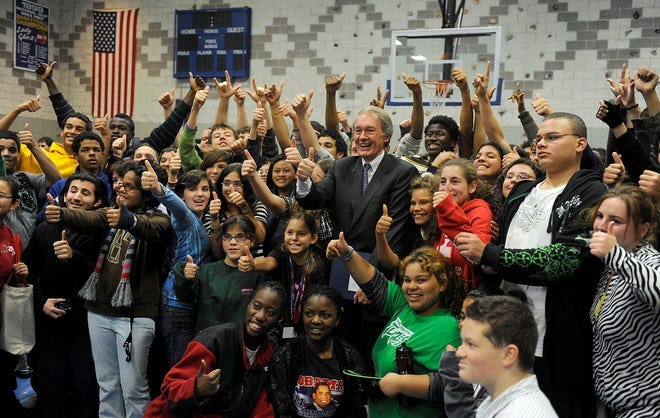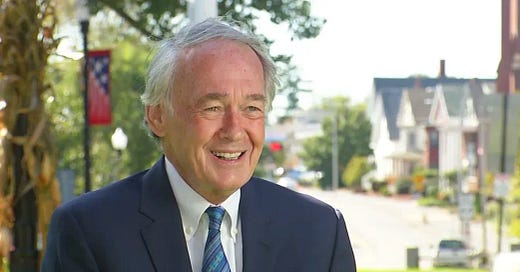“Hope is the most important four-letter word in the language,” spoke Senator Ed Markey on the U.S. Senate Floor on May 24, 2005.

After looking at the picture above, I have no idea if anyone has become a Deaflympian since it was taken in 2010; they could be in their 20s and 30s now.
Suppose no one among these Lexington School students became a Deaflympian, it could be crystal clear to blame the federal legislators for voting for amending the Paralympics into the Amateur Sports Act of 1978 (ASA) in 1998 (then renamed as the Ted Stevens Olympic and Amateur Sports Act of 1998 (TSOASA) without the thought of Deaflympians’ needs. The U.S. Olympic and Paralympic Committee (USOPC) suddenly closed its doors to deaf athletes in 2003 after creating the Paralympic Division. No more USOPC Developmental Funds to the American Athletic Association of the Deaf (AAAD) (renamed to the USA Deaf Sports Federation [USADSF] in 1997) since then.
Terminating this fund also closed the “physical” Office of the USADSF Executive Director in Sioux Falls, South Dakota, in the early 2000s.
Under the period of the Amateur Sports Act (1978-1998), the USOC awarded the USOC Developmental Funds to the AAAD and four other sports organizations for the disabled annually since the late 1980s. In 1995, the USOC increased the amount of the funds for the AAAD to enable them to pay the salary expense of the first-ever Executive Director and rent the office in downtown Ogden, Utah, for only 47 cents a square foot!
The shrine of the new AAAD Office led Dr. Robert G. Sanderson, a Deaf community leader in Utah, to nominate Dennis R. Platt, a local sports leader, who then was AAAD Vice President and a strong supporter for the passage of the ASA, to carry the Olympic Torch through Ogden. Despite being deaf, Dennis became among the 223 Utahns who carried the Olympic flame through the state on its way to Atlanta for the opening ceremonies.
On May 10, 1996, Dennis carried the torch on Washington Boulevard in Ogden and passed the AAAD Office, where his wife, Shirley, worked as the first-ever AAAD Executive Director.
Under the period of the Ted Stevens Olympic and Amateur Sports Act (1998 to present), the lack of the USOC fund caused a new USADSF President to be unable to budget for the salary of the Executive Director and the office expenses. (Today, the USADSF is still struggling to find a person to fill the part-time position of Executive Director.)
Tomorrow, the Subcommittee on Consumer Protection, Product Safety, and Data Security of the U.S. Senate Committee on Commerce, Science, and Transportation will hold a hearing titled “Promoting a Safe Environment in U.S. Athletics.”
Look at the list of Subcommittee members:
John Hickenlooper, Colo. (Chair)
Amy Klobuchar, Minn.
Brian Schatz, Hawaii
Edward Markey, Mass.
Tammy Baldwin, Wis.
Tammy Duckworth, Ill.
Ben Ray Luján, N.M.
Peter Welch, Vt.
Marsha Blackburn, Tenn. (Ranking Member)
Deb Fischer, Neb.
Jerry Moran, Kan.
Dan Sullivan, Alaska
Todd Young, Ind.
Ted Budd, N.C.
Cynthia Lummis, Wyo
Sen. Edward Markey's name has caught the eye of deaf sports leaders because he is one of the few Deaf champions on Capitol Hill.
Senator Markey introduced the 21st Century Communications, Video, and Accessibility Act (CVAA), which President Obama signed into law in October 2010. The legislation’s mission was to increase the access of persons with disabilities to modern communications and for other purposes. Read the National Association of the Deaf Statement about this Act.
Last September, he reintroduced the Alice Cogswell and Anne Sullivan Macy Act, which would strengthen the Individuals with Disabilities Education Act (IDEA) while ensuring that blind, deaf, deaf-disabled, and deaf-blind children receive the support and services from qualified personnel they need to succeed and thrive.
So, it is time for the Senator to jump from the technology field to the sports field.
The Deaf sports community HOPES that Sen. Markley would question Dionne Koller, Co-Chair of the Commission on the State of U.S. Olympics and Paralympics (CSUSOP), at tomorrow’s hearing:
Why did your commission not recommend that Congress amend the Deaflympics into the Ted Stevens Olympic and Amateur Sports Act?
The Committee should deny the CSUSOP recommendation to rename the Ted Stevens Olympic and Amateur Sports Act (TSOASA) as the Ted Stevens Olympic and Paralympic Sports Act (TSOPSA.)
Read my reason in my issue - Ted Stevens Olympic and Paralympic Sports Act-??????? (dated March 15, 2024)
To Be Continued
NOTE: As an old pro at Capitol Hill, I am writing this newsletter issue as a former USO[P]C-appointed member of the USO[P]C Handicapped in Sports Committee (1979-81). I have no connection with the USADSF on this matter.





